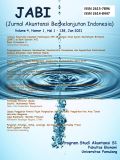Pengaruh Cash Flow dan Leverage terhadap Cash Holding
DOI:
https://doi.org/10.32493/JABI.v1i1.y2022.p20-28Keywords:
Cash Flow, Leverage, Cash HoldingAbstract
This study aims to determine the Influence of Cash Flow and Leverage on Cash Holding, an Empirical Study on Manufacturing Companies in the Food and Beverage Sub-sector listed on the Indonesia Stock Exchange in 2015-2020. This type of research is quantitative where to get a sample of 66 data using the purposive sampling method. This study uses secondary data from the annual report on the idx.go.id web which is then processed by panel data regression analysis using EViews 10. The results of this study are simultaneously that cash flow and leverage have a significant effect on cash holding. Partially, cash flow has no effect on cash holding. However, partially leverage has a negative effect on cash holding
References
Akben-Selcuk, E., & Altiok-Yilmaz, A. (2017). Determinants of corporate cash holdings: Firm level evidence from emerging markets. In Global Business Strategies in Crisis (pp. 417-428). Springer, Cham.
Amahalu, Nestor and Bwatrice. 2017. Effect of Cash Holding on Financial Performance of Selected Quoted Insurance Firms in Nigeria. Journal of Marketing Management and Consumer Behavior, 2(1): 90-112.
Christina,Yessica dan Ekawati,Erni.2014.Excess Cash Holdings dan Kepemilikan Institusional pada Perusahaan Manufaktur.Jurnal Manajemen Bisnis dan Kewirausahaan, vol. 8 no. 1.
Gunawan, R. (2016). Pengaruh Growth Opportunity, Net Working Capital Dan Cash Flow Terhadap Cash Holding (Studi Pada Perusahaan Manufaktur Yang Terdaftar di BEI tahun 2011-2014). Jurnal Akuntansi, 4(1).
Hery. 2015. Analisis Laporan Keuangan. Jakarta. PT. Grasindo.
Islam, S. Z., & Khandaker, S. (2015). Firm leverage decisions: does industry matter?. The North American Journal of Economics and Finance, 31, 94-107.
Liadi, C. C. dan I. K. Suryanawa. 2018. Pengaruh Ukuran Perusahaan, Net Working Capital, Cash flow , dan Cash Conversion Cycle pada Cash Holding. E-Jurnal Akuntansi Universitas Udayana.24(2): 1474-1502
Mesfin, E. A. (2016). The factors affecting cash holding decisions of manufacturing share companies in Ethiopia. International Journal of Advanced Research in Management and Social Sciences, 5(3).
Monica, A., & Suhendah, R. (2020). Pengaruh Firm Size, Leverage, Dan Investment Opportunity Terhadap Cash Holding. Jurnal Paradigma Akuntansi, 2(1), 176-185.
Riyanto, D. (2018). Analisis Pengaruh Risiko Kredit, Likuiditas Dan Permodalan Terhadap Profitabilitas Perbankan (Studi Pada Perusahaan Bank Umum Yang Terdaftar di BEI Tahun 2012–2016) (Doctoral dissertation, Universitas Mercu Buana Jakarta).
Sanjaya, Y. D., & Widiasmara, A. (2019, November). Analisis Faktor-Faktor Yang Mempengaruhi Cash Holding Pada Perusahaan Sektor Industri Barang Konsumsi Di BEI Tahun 2014-2017. In SIMBA: Seminar Inovasi Manajemen, Bisnis, dan Akuntansi (Vol. 1).
Suwandi, S. (2020). Pengaruh Cash Flow, Net Working Capital, dan Firm Size Terhadap Cash Holding dengan Growth Opportunity sebagai Variable Moderating (Study pada Perusahaan Pertambangan yang Terdaftar di BEI Periode 2014-2018) (Doctoral dissertation, Universitas Islam Negeri Alauddin Makassar).
Zulyani, Z., & Hardiyanto, H. (2019). Faktor-Faktor Yang Mempengaruhi Cash Holdings Pada Perusahaan Pelayaran Di Indonesia. Inovbiz: Jurnal Inovasi Bisnis, 7(1), 8-14.
Downloads
Published
Issue
Section
License
Authors who publish with this journal agree to the following terms:
- Authors retain copyright and grant the journal right of first publication with the work simultaneously licensed under a Creative Commons Attribution License that allows others to share the work with an acknowledgement of the work's authorship and initial publication in this journal.
- Authors are able to enter into separate, additional contractual arrangements for the non-exclusive distribution of the journal's published version of the work (e.g., post it to an institutional repository or publish it in a book), with an acknowledgement of its initial publication in this journal.
- Authors are permitted and encouraged to post their work online (e.g., in institutional repositories or on their website) prior to and during the submission process, as it can lead to productive exchanges, as well as earlier and greater citation of published work (See The Effect of Open Access)

This work is licensed under a Creative Commons Attribution-ShareAlike 4.0 International License.


 PUBLICATION ETHICS
PUBLICATION ETHICS FOCUS AND SCOPE
FOCUS AND SCOPE EDITORIAL TEAM
EDITORIAL TEAM REVIEW PROCESS
REVIEW PROCESS CONTACT US
CONTACT US AUTHOR GUIDELINES
AUTHOR GUIDELINES




